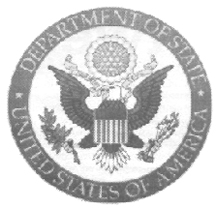Installment One Hundred and Seven
When documentary evidence is insufficient to support a family-based claim to citizenship or visa eligibility, DNA testing, also known as genetic testing, is an option. For example, when a parent’s name was omitted from a child’s birth certificate, or if there are questions about authenticity, DNA testing is one way to establish the biological relationship. DNA testing is voluntary; all expenses and risks are the responsibility of the parties involved. Submitting to a DNA test does not guarantee approval for a U.S. visa or passport.
Q: How do I arrange a DNA test?
 The petitioner (or person in the United States) should contact an
The petitioner (or person in the United States) should contact an
approved U.S. laboratory to perform the test. Different laboratories may
have different prices and procedures, so the petitioner may want to call a
few laboratories to compare before selecting one. The U.S. Embassy will only accept the results of DNA tests done by laboratories in the United States that are accredited by the American Association of Blood Banks (AABB). Accepted laboratories can be found at the internet website http://www.aabb.org.
The petitioner (or person in the United States) should have his/her DNA collected at the AABB laboratory located in the United States. If the petitioner will be in Guyana when the test is conducted, the petitioner must inform the lab that his/her sample will also be collected at the U.S. Embassy in Georgetown.
2) The U.S. laboratory will then send a collection kit and a prepaid DHL or Federal Express airway bill directly to the U.S. Embassy in Georgetown (100 Young and Duke Streets, Kingston, Georgetown, Guyana). The U.S. Embassy will contact the person/people to be tested either by letter or by telephone to schedule an appointment for DNA collection at the U.S. Embassy in Georgetown. Once you have an appointment letter, you must go to St. Joseph’s Mercy Hospital (132 Parade Street, Kingston, George-town) to pay a G$2,000 fee for the collection of the DNA sample.
On the date and time stated on your appointment letter, you must come to the Consular Section of the U.S. Embassy. Walk with your appointment letter, the receipt for the G$2,000 fee, a passport-size photo for each person to be tested, and a photocopy of the biographic page of the passport of each person to be tested.The Embassy sends the sample by DHL or Federal Express to the U.S. laboratory chosen by the petitioner.
Q: How is a sample actually collected?
A medical assistant will ask you to open your mouth and will rub a cotton swab, like a Q-tip, on the inside of your cheek (in your mouth) to collect the DNA sample. The process does not hurt.
Q: How will I know the test results?
The laboratory usually sends one copy of the results to the petitioner (or person in the U.S.) and one copy to the Consular Section, if the applicant’s case is being processed there. It takes about 6 weeks to get results. If you are applying for an immigrant visa, you can check the status of your case on the Embassy’s website at http://georgetown.usembassy.gov immigrant-visas/case-status-online.html. If you are applying for a U.S. passport or Consular Report of Birth Abroad (CRBA), you can contact American Citizen Services at 592-225-4900 ext 4222.
“Ask the Consul” is a fortnightly column from the U.S. Embassy answering questions about U.S. immigration law and visa issues. If you have a general question about visa policy please email it to us at AskGeorge @state.gov. We select questions every other week and publish the answers in Stabroek News and on our website at http://georgetown. usembassv.gov/ask-the-consul.html . Information about visas and travel can be viewed at http://georgetown.usembassy.gov, http://travel.state.gov, and at http://www.dhs. gov. Applicants are strongly encouraged to prepare their own documents and avoid third-party advice. U.S. Consular rules change frequently and non- US government advisors often provide inadequate or inaccurate information.
Other than the questions we select, we DO NOT respond to questions sent to Ask the Consul. Please contact the visa inquiries unit (email visageorge@state.gov or call 225-7965 between 8 am and 4 pm Monday through Friday) if you have questions about a specific case.




